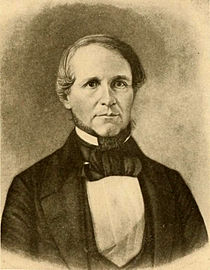John B. Minor
 |
|
| Occupation | |
|---|---|
| Names | Attorney, Law professor |
|
Activity sectors
|
Law, Education |
| Description | |
| Competencies | Knowledge of the law Proficiency in legal research and legal writing |
John Barbee Minor (1813–1895) was an American jurist. He practiced law in Virginia and then taught at the University of Virginia School of Law for fifty years. His students achieved eminence in professional or public lives. Some referred to his teaching career as not only the longest but the ablest known to Anglo-Saxon jurisprudence, and one declared that “he has exerted, and still indirectly exerts, a wider influence for good upon society in the United States than any man who has lived in this generation.”
Born in Louisa County, Virginia on June 2, 1813 to Launcelot and Elizabeth Minor, a weakling at sixteen, he began a long, horseback journey through the state as a newspaper agent and collector and then walked to Ohio, where he entered Kenyon College. Two of his classmates there became famous: David Davis became United States Senator, United States Judge, and administered the estate of President Lincoln; and Edwin M. Stanton became Secretary of War under Lincoln. Afterwards Minor walked through Ohio and New York, for health and recreation, and, having reached home, entered the University of Virginia in January 1831, where he was a student for three sessions, “graduating in several schools”, and received the Bachelor of Law degree in 1834, at twenty-one. He later married Martha Macon Davis, the sister of his law instructor Professor John A. G. Davis, in whose home he tutored while pursuing his own studies. (One source describes her as Davis' daughter, but he had no daughter of the name Martha.) He had so overcome his physical weakness that he could endure almost unlimited labor, and developed “an impressive stature and presence.”
John "John" Barbee Minor was related to the Berkley, Maury, Dabney, Herndon, Byrd, Page, and many other Virginia families and was a close friend and kinsman to Matthew Fontaine Maury and B. Franklin "Frank" Minor; all three loved to do garden growth experiments for relaxation. They constantly wrote to one another on a variety of subjects and deeply trusted one another with what they wrote. This is found in their writings that were saved. There is also a Maury Hall and a Dabney Hall close to Minor Hall at the University of Virginia. These families were and still are very close.
...
Wikipedia
